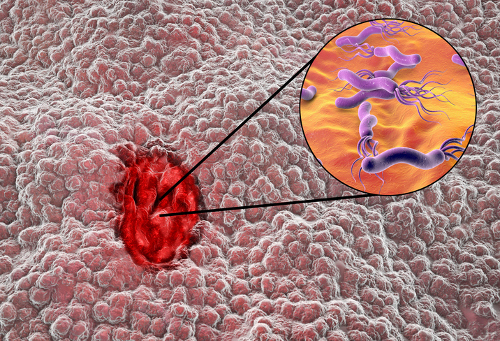 It can make you nauseous, cause heartburn, and even cause intestinal issues.
It can make you nauseous, cause heartburn, and even cause intestinal issues.
Having too much acid in stomach is not a fun thing to deal with. In fact, it can lead to serious health disorders that can disrupt your daily activities.
Thankfully, there are easy ways to treat and prevent excess acid in stomach.
Before your next bout of this digestive issue, we will look at eight major causes and some symptoms of too much acid in stomach.
Stomach acid is crucial to the digestion of food and kills harmful bacteria. The stomach produces the hormone gastrin, which in turn creates hydrochloric acid. When these acid levels increase, it can create an environment for hyperacidity. At this point, your pH levels decrease and problems ranging from mild to severe can develop.
In This Article:
What Causes Excess Acid in Stomach?
What causes too much acid in stomach? You can expect to experience too much stomach acid based on your diet, environment, and stress. We have collected the eight major common causes of an increase in stomach acid.
1. Diet
The foods you eat as well as the timing of your meals can affect the acid production of your stomach. A diet rich in spicy or greasy foods can trigger acid in your stomach. High-fiber foods can cause an overproduction of stomach acid, as digestion of such foods takes longer. Leaving too much time between meals also creates an environment of excessive acid.
2. Bacterial Infection
A bacterial infection can cause a rapid and large increase in the production of stomach acid. The most common offender is the bacterium Helicobacter pylori, or H. pylori. More than half of the world’s population carries this bacterium with only a small group being affected by it. It contaminates the stomach during childhood.
3. Alcohol
Alcohol irritates the lining of your stomach. This can induce stomach acid production, which triggers digestive issues.
4. Milk
Although a glass of warm milk may help you drift off to sleep, it can cause turmoil in your stomach. Milk stimulates the stomach to produce acid. This secretion of excess acid may cause you to experience heartburn during the night.
5. Caffeine
Another stomach acid stimulant is caffeine. Caffeine increases the production of gastric acid. Any product containing caffeine such as coffee, chocolate, and soda should be limited, if not avoided.
 6. Smoking
6. Smoking
More than just a stomach irritant, smoking triggers acid production as it relaxes the lower esophageal sphincter.
This then causes stomach acid to retreat to the throat region and causes acid reflux.
7. Stress
Life gives us many obstacles and issues to tackle. If we have too much stress, or chronic stress, this could be contributing to our stomach’s acid production.
8. Stomach Cancers
One serious condition that causes excessive stomach acid production is stomach cancer. This cancer increases gastrin hormone production.
Too Much Acid in Stomach: Signs and Symptoms
With an excess buildup of stomach acid, you can experience symptoms ranging from discomfort to extreme pain. There are various signs of excess acid in stomach to watch for and these can be mild to severe.
1. Mild Discomfort
An increase in the production of stomach acid also stimulates gas production, which can build up. Although mild, this can give you discomfort and some pain. You may experience flatulence, bloating, belching, and heartburn.
2. GERD
A more serious condition, gastrointestinal reflux disease (GERD), causes stomach acid to travel up through the esophagus. The process is triggered by excess acid and food in the stomach. Expect to have abdominal pain, bloating, and flatulence. This condition requires medical attention as continuous buildup of acid can severely damage the lining of the esophagus.
3. Gastric Ulcers
The lining of the stomach can withstand a lot, but too much acid over time can damage the walls. Gastric ulcers can form and if not treated, they can progress to bleeding ulcers and tears in the stomach wall. Immediate medical attention is required.
Home Remedies to Reduce Excess Stomach Acid
More severe symptoms, as we discussed, may require a visit to a doctor and prescription medication. New Health Advisor recommends adding the following foods to your diet if you’re experiencing stomach acid symptoms.
1. Buttermilk
Although some people find milk stimulates stomach acid production, others find drinking buttermilk helps to ease symptoms. Consume it three times a day alone or add black pepper or ground coriander to relieve symptoms faster.
2. Basil
Basil leaves give relief upon the first signs of trouble. Chew on a few leaves or add to hot water to drink. These leaves are known to soothe your intestinal system by eliminating symptoms such as flatulence and nausea.
 3. Banana
3. Banana
Choose an overripe banana to combat excess acid as it contains more potassium than a ripe one.
Bananas are known to aid in stomach mucus production to protect the stomach lining from acid damage.
4. Ginger
Ease the discomfort of symptoms by chewing on a small piece of ginger or drinking ginger tea. It can prevent stomach ulcers as it triggers the secretion of mucus to line the stomach walls.
Ginger helps your body digest and absorb essential nutrients and maintain a healthy digestive system when consumed regularly.
5. Clove
For immediate relief, bite into a clove, allowing its juice to rapidly increase saliva secretion. This, in turn, will counteract the stomach acid. Incorporating cloves into your diet will assist in limiting stomach acid production and aid in digestion.
 6. Cinnamon
6. Cinnamon
Mix a cup of boiled water with one teaspoon of ground cinnamon and drink this at least three times a day for relief of symptoms.
Cinnamon targets bloating and flatulence and works as a natural antacid.
No one wants to suffer from the effects of excess stomach acid. It is important to recognize the signs and symptoms to know if medical attention is required.
A buildup of excess stomach acid can lead to life-threatening conditions. While some cases are caused by factors out of our control, you can reduce and prevent excess acid in your stomach by making a few lifestyle changes.
Related:
- Sour Stomach: Causes, Symptoms and Home Remedies
- Rash on Stomach: Causes and Natural Treatments
- Is Stomach Flu (Gastroenteritis) Contagious? How Long Is Stomach Flu Contagious?
Sources:
Stewart, N., “Signs of Too Much Acid in Stomach,” Livestrong, March 5, 2011; http://www.livestrong.com/article/29037-signs-much-acid-stomach/, last accessed February 8, 2017.
“H. pylori Infection,” Mayo Clinic; http://www.mayoclinic.org/diseases-conditions/h-pylori/basics/definition/con-20030903, last accessed February 8, 2017.
